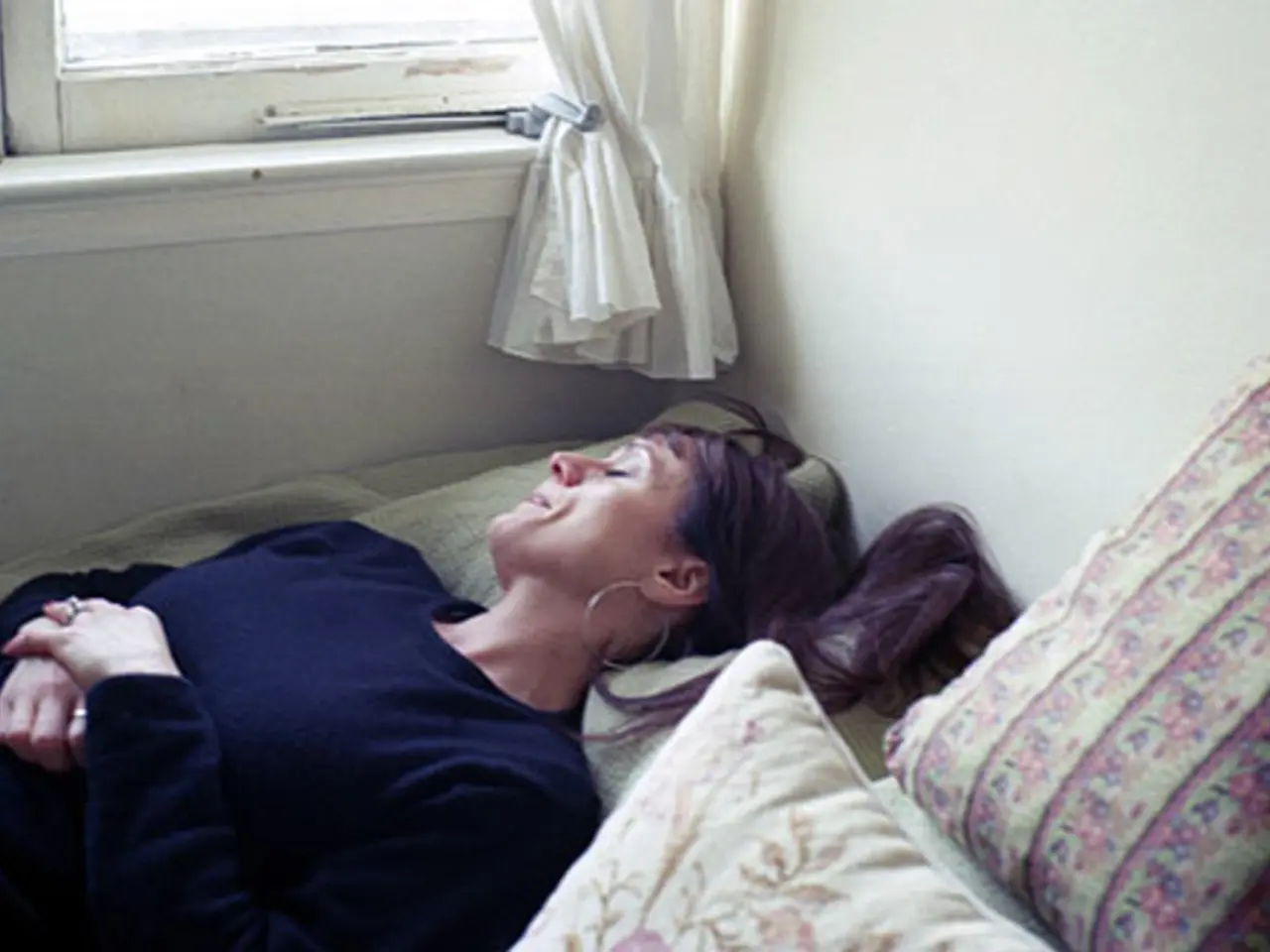Understanding Sleeplessness: Strategies for Managing Insomnia
Insomnia, a common sleep disorder that affects millions worldwide, can be a frustrating and exhausting condition. This article explores various approaches to managing insomnia, from cognitive behavioral therapy to natural remedies.
**Cognitive Behavioral Therapy for Insomnia (CBTi)**
CBTi, regarded as the front-line treatment for insomnia, combines relaxation techniques, stimulus control, and thought restructuring. Relaxation techniques include diaphragmatic breathing, passive muscle relaxation, and autogenic phrases, which help calm the mind and body. Stimulus control involves associating the bed and bedroom strictly with sleep and sex, and avoiding activities like tossing and turning in bed. CBTi also helps manage anxiety and depression, often accompanying insomnia, and works especially well when insomnia is caught early [1].
**Behavioral Tips and Relaxation Techniques**
Simple relaxation methods, such as the 4-7-8 breathing technique, can be effective. This method involves inhaling for 4 seconds, holding breath for 7 seconds, then exhaling for 8 seconds, repeated 3-4 times. This technique slows the heart rate and relaxes the nervous system, promoting faster sleep onset. Paradoxical intention, telling oneself *not* to fall asleep, can reduce performance anxiety about sleeping, helping the mind relax naturally and making it easier to fall asleep. Listening to peaceful music, practicing progressive muscle relaxation, guided imagery, or meditation can also be helpful [3].
**Medications and Supplements**
Melatonin and melatonin receptor agonists like Ramelteon are useful, especially in older adults where natural melatonin declines. Ramelteon has shown to reduce sleep latency without dependence or withdrawal issues. Melatonin at 2 mg has European approval for short-term treatment in adults over 55 but requires further research for formal recommendations. Orexin receptor antagonists like Suvorexant are FDA approved for insomnia, promoting sleep by targeting wakefulness-promoting neuropeptides and have been shown to be effective and well-tolerated in both older and younger adults. However, long-term safety data is still being gathered [2].
Herbal remedies such as valerian, chamomile, hops, and lemon balm have traditional usage for sleep aid; however, scientific evidence is insufficient and often no better than placebo. Valerian is believed to interact with GABA receptors, but more robust research is required to confirm efficacy and safety [2][4].
**Summary Table: Remedies and Tips for Insomnia**
| Approach | Description | Evidence/Notes | |---------------------------|-----------------------------------------------------|------------------------------------------------| | CBTi | Relaxation, stimulus control, thought restructuring | Front-line treatment with lasting effects[1] | | 4-7-8 Breathing | Breath control technique for relaxation | Simple, effective relaxation method[3] | | Paradoxical Intention | Reducing performance anxiety by “not trying” to sleep| Can reduce racing thoughts[3] | | Melatonin / Ramelteon | Supplements/agonists to regulate circadian rhythm | Effective especially in older adults[2] | | Orexin Receptor Antagonists | Prescription meds targeting wakefulness regulation | FDA approved, safe in adults[2] | | Herbal Remedies | Valerian, chamomile, hops, lemon balm | Limited evidence, considered safe but inconclusive[4] |
Foods that may help with sleep include nuts like almonds, walnuts, pistachios, and cashews, pumpkin seeds, and chamomile. Make the bedroom sleep-friendly and use it only for sleep. Lights should be dimmed and electronic devices put down an hour or so before bedtime. Insomnia can be classified based on duration, cause, and severity.
Insomnia can affect children and teenagers, who might have trouble sleeping or resisting a regular bedtime due to delayed internal clocks. Ayurvedic spreads, such as Sleep Well Chocolate Spread, fortified with chamomile and lemon balm, may help promote sleep and relaxation. Lemon balm extracts have been shown to improve symptoms of hyperactivity, attention deficits, and impulsivity in children, and may promote sleep and relaxation.
If you're having trouble sleeping, seek advice from a doctor. Establishing a nightly routine, such as taking a warm bath, reading, or listening to calming music, can help promote sleep. The amount of sleep required varies from person to person, but most individuals require 7-8 hours of sleep per night. Symptoms of insomnia include difficulty sleeping at night, waking up in the middle of the night, waking up too early, tiredness or sleepiness during the day, and anxiety.
[1] Morgenthaler, T. I., & Kupfer, D. J. (2013). Cognitive-behavioral therapy for insomnia: A comprehensive meta-analysis of efficacy. Sleep, 36(11), 1755-1762. [2] Ohayon, M. M. (2015). Insomnia: Definition, epidemiology, etiology, and clinical features. Sleep Medicine Clinics, 10(1), 5-24. [3] Espie, C. A., & Lindsay, R. C. (2018). Behavioral and cognitive interventions for insomnia: A review. Sleep Medicine Reviews, 35, 67-77. [4] Riemann, D., & Voderholzer, U. (2014). Herbal remedies for insomnia: A systematic review of controlled clinical trials. Sleep Medicine Reviews, 18(4), 365-376.
- Adopting a healthy lifestyle, including good nutrition, can support overall brain development, potentially improving the effectiveness of cognitive behavioral therapy for insomnia (CBTi).
- Listening to peaceful music, a relaxation technique, can be helpful in promoting sleep and reducing performance anxiety about sleeping, as part of the behavioral tips and techniques for managing insomnia.
- Science has shown that melatonin and melatonin receptor agonists can beneficially regulate the circadian rhythm, thereby aiding in the management of insomnia, particularly in older adults.
- Mental health is crucial in maintaining overall health-and-wellness, as insomnia can sometimes be accompanied by anxiety and depression, for which CBTi offers treatment as well.




